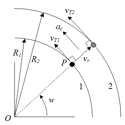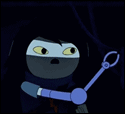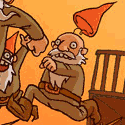Seldom Posts posted:If you're suggesting that I'm arguing that, then you've misread my post. I think that Banks raises that question and leaves the answer ambiguous. You're quite right, sorry about that. Certainly Banks has said that he personally considers the Culture the closest possible thing to a perfect utopia, and that any ambiguity stems from the fact that writing about perfectly happy lives isn't interesting - but let's forget the author's intentions, because I get where you're coming from now. Seldom Posts posted:You're assuming this is a good thing, and I'm saying that Banks is asking you to question that assumption. As an example, what do you think of the way Gurgeh chose to live his life and what happened to him? The Culture allowed him to choose the life he wanted, and then manipulated him into destroying another culture that reflected the values he had chosen. Was the Culture right to do that? This is where it gets very tricky, and it really stems from the wider interventionist issues of the Culture. In any normal, real world (or more realistic) situation, the intervening party would have no right to do that - when the decision comes from supposedly near omniscient Minds, it becomes more ambiguous. I suppose the problem with liberalism, like many other things, is that it tends to fall apart in anything less than perfect circumstances. SC doing whatever the gently caress it wants throughout the books is an illustration of that, because, good as the Culture is, it certainly isn't perfect. But I'd still say that a post-scarcity society doesn't necessarily entail interventionism. Seldom Posts posted:I am saying that the question of 'meaning' for most people depends on the extent to which the scarcity problem is solved for them. So when Banks raises it, he's really talking about the rich and the poor. I was pretty much saying the same thing, may not have come across.
|
|
|
|
|

|
| # ? May 14, 2024 15:53 |
|
Barry Foster posted:This is where it gets very tricky, and it really stems from the wider interventionist issues of the Culture. In any normal, real world (or more realistic) situation, the intervening party would have no right to do that - when the decision comes from supposedly near omniscient Minds, it becomes more ambiguous. I suppose the problem with liberalism, like many other things, is that it tends to fall apart in anything less than perfect circumstances. SC doing whatever the gently caress it wants throughout the books is an illustration of that, because, good as the Culture is, it certainly isn't perfect. But I'd still say that a post-scarcity society doesn't necessarily entail interventionism. Interesting point re: omnipotence--does the ability of the Mind's obligate them to intervene? The other interesting thing is that when I asked "was the Cultre right to do that?" I was thinking more about the effect on Gurgeh then the intervention effect on the other society (shows my own bias)--I was thinking it was pretty drat ruthless of the Minds to use Gurgeh like that, which to me suggests an even darker answer to the intervention question.
|
|
|
|
Flipswitch posted:The drones in the Culture series are generally excellent all around, the one with the ceramic(?) plating in Look to Windward being my favourite. E.H. Tersono was a dick, but a lovable one.
|
|
|
|
Barry Foster posted:Not to get too political because this isn't D&D, but the idea that the only way to find meaning in life is through a daily struggle for existence is by no means a true one. Many (me included) would argue that it's a dominant ideology of our current, (somewhat artificially) scarcity-based society, and one predicated on exploitation and authority. Not having anyone starving to death, having to work for 15 hours a day, or even spend their lives having to pay off debt (ie, the Culture) wouldn't suddenly and inevitably make everyone brainless, hedonistic blobs. Sure, it may make some people brainless, hedonistic blobs, but it'd also leave a lot of other people free to pursue whatever they want to pursue. Hell, if they want to live miserable lives, they're free to do that as well - but I think that's a fair price to pay for an egalitarian society where no-one is forced to suffer. I see someone's read their Althusser. Yeah, this in A Thing in the Culture, the exploration of why they haven't ascended like all the other interventionist level societies. I think the Culture is interesting in that it's a society that reached the Marxist utopia 'the blunt force way' by simply making scarcity a non-issue for everybody (or at least, everyone in their little corner of the Galaxy) rather than through societal reformation. In this way they're still... liberal I almost want to say, and so start Special Circumstances and Contact to keep futzing around with other cultures.
|
|
|
the JJ posted:I see someone's read their Althusser. Yeah Contact/SC is specifically stated to be an avenue for finding meaning (provably helping other beings) in an otherwise possibly meaningless life. Of course the majority of Culture citizens don't really care about existential stuff like that and live to have fun, which is also why the Minds stick around. There's a varied and interesting universe to play with, even if the majority of it is mundane and predictable, people to know, even if most of them are pretty boring, crises to contain, even if most aren't really terribly threatening. And of course Infinite Fun Space. The Culture exists to enjoy itself, which is agreed to be a pretty good reason for the most part. People/drones/Minds that need something more go in to Contact and SC.
|
|
|
|
|
Prolonged Priapism posted:Yeah Contact/SC is specifically stated to be an avenue for finding meaning (provably helping other beings) in an otherwise possibly meaningless life. Which book says this? quote:The Culture exists to enjoy itself, which is agreed to be a pretty good reason for the most part. You mean agreed by the Culture right? I don't think this is a clear message in the books I read--it's pretty explicitly challenged in CP, PofG and Use of Weapons.
|
|
|
Seldom Posts posted:Which book says this? Well I think it's most explicitly stated in the appendicies of Consider Phlebas, where the mission of Contact (and SC) is given as the reason entire for the Culture entering the war at all: CP Appendix, reason for the war, Culture posted:The only desire the Culture could not satisfy from within itself was one common to both the decendants of its original human stock and the machines they had (at however great a remove) brought into being: The urge not to feel useless. The Culture's sole justification for the relatively unworried, hedonistic life its population enjoyed was its good works; the secular evangelism of the Contact Section, not simply finding, catalouging, investigating and analysing other, less advanced civilisations but - where the circumstances appeared to Contact to justify so doing - actually interfering (overtly or covertly) in the historical processes of those other cultures. ... tl;dr: Contact and its good works are so important to the Culture's collective conscience and feeling of purpose that they go to war because the Idiran expansion could be seen to challenge the mission of Contact. There are other, less direct and comprehensive summaries of the situation that say basically the same thing in most of the books. quote:You mean agreed by the Culture right? Yeah, I meant by the Culture in general. Although of course individuals and whole factions might disagree. The people directly involved in Contact and SC would probably see their existence as justified by the good works they do, and the Minds stick around partly out of love/pity/the protective instincts they feel toward humans and other easy to kill biologicals. In their off time Minds, Contact and SC obviously have fun. Here's Banks in A Few Notes on the Culture: (an essay he wrote in the 90s, it's online just search the title) quote:The humans of the Culture, having solved all the obvious problems of their shared pasts to be free from hunger, want, disease and the fear of natural disaster and attack, would find it a slightly empty existence only and merely enjoying themselves, and so need the good-works of the Contact section to let them feel vicariously useful. For the Culture's AIs, that need to feel useful is largely replaced by the desire to experience, but as a drive it is no less strong. The universe - or at least in this era, the galaxy - is waiting there, largely unexplored (by the Culture, anyway), its physical principles and laws quite comprehensively understood but the results of fifteen billion years of the chaotically formative application and interaction of those laws still far from fully mapped and evaluated. quote:I don't think this is a clear message in the books I read--it's pretty explicitly challenged in CP, PofG and Use of Weapons. You're right. That challenge is the reason the books exist/are interesting beyond the colorless sort of impersonal world building you can see in the essay I quoted above. Each book is ambigious in its own way, and you're obviously free to draw you own conclusions regarding the morality/justification/rightness of the Culture and particularly what it does to individuals in pursuit of its ideals (manipulating them in the least charitible interpretation), but I think the books mostly side with the Minds and SC and Contact and the Culture on the whole being in the right. Use of Weapons and Look to Windward probably have the most blatant 'the Culture hosed up' moments/themes. But even then, they smugly do their best...
|
|
|
|
|
Prolonged Priapism posted:Great post, I'll look that stuff up and also re-read CP, I had forgotten about that stuff at the end.
|
|
|
|
Thanks! I love the setting of the Culture so much.
|
|
|
|
|
I love most banks titles. I even thought the Algebraist was perfect once I figured out what it referred to. But hydrogen sonata I just don't understand, sadly. I'm hoping to be surprised.
|
|
|
|
Prolonged Priapism posted:Thanks! I love the setting of the Culture so much. Just cover art apparently. 
|
|
|
Well! That'll teach me to blindly ask for new info without looking myself. Here's a summary from http://en.risingshadow.net/library?action=book&book_id=36757Risingshadow user(?) Jussi posted:It is, truly, provably, the End Days for the Gzilt civilization. efb on the cover: Sweet, they made Coruscant in Blender.  Anyway, this seems like an interesting premise (assuming it's legit). Getting in to the deep history of the Culture, and Subliming. Hopefully he can keep it interesting and not strip the mystery away, because Subliming a pretty badass concept and I like how it's been dealt with so far. Anyway, this seems like an interesting premise (assuming it's legit). Getting in to the deep history of the Culture, and Subliming. Hopefully he can keep it interesting and not strip the mystery away, because Subliming a pretty badass concept and I like how it's been dealt with so far.As to the title, in light of the whole focus on Subliming - I'll guess The Hydrogen Sonata refers to the evolution of the material universe (which is of course overwhelmingly composed of hydrogen, in stars and between them). Sonata (via Wikipedia) in music, literally means a piece played as opposed to a cantata, a piece sung. Pretty, and ambigious. And the oppositional nature of the term sonata - maybe highlighting the difference between the material universe and wherever the Sublimed go? Singing sounds a lot more heavenly than playing... Who knows!
|
|
|
|
|
So we get to learn more about Subliming and the Culture's backstory? Sounds interesting. I've kind of been hoping Banks would do a story set closer to the foundation of the Culture. Not all the way back to the beginning, I don't think we need an origin story, but set in a time when the Culture's tech was a little less godlike and the galaxy was a little less bureaucratic and orderly. It would be an elegant way of granting more agency to the human characters while sketching in some history as well.
|
|
|
|
Any advise for what Culture novel to read after Consider Phlebas, Player of Games and Use of Weapons?
|
|
|
|
Look to Windward, then Excession.
|
|
|
|
Then Matter, then Surface Detail. You've already read most of the absolute best the Culture series has to offer, and the two latest books suffer a bit from bloat and a few narrative blips, but they're still fun reads, and full of Culture-y goodness.
|
|
|
|
|
No love for Inversions?
|
|
|
|
The Dark One posted:No love for Inversions? I love inversions.
|
|
|
The Dark One posted:No love for Inversions? Still haven't read it, but as I understand it's not a Culture Culture novel, right? I'll probably get round to it, but I'm hamstrung by an inevitable bias, which is 'no drones or ships? Don't care' 
|
|
|
|
|
Barry Foster posted:Still haven't read it, but as I understand it's not a Culture Culture novel, right? I'll probably get round to it, but I'm hamstrung by an inevitable bias, which is 'no drones or ships? Don't care' There is a drone of sorts, but it's not talkative and probably not very smart. Though with the Culture, who knows?
|
|
|
|
Barry Foster posted:I particularly like that he completely subverted the skynet 'super computer gets out of control, begins to improve itself spontaneously, wipes out creators' trope. The Minds may or may not have been an accident thousands of years ago, but when they started learning exponentially they just decided that being cool to their creators was the rational and humane thing to do. 'AI takes over humanity' is usually presented as horrifying - with the Culture, it made perfect sense. As I've said before, I'd sure as hell prefer the world to be run by a Mind. I think the main reason the standard trope occurs is out of a fear (maybe justified) that an AI would tend to run things much the same way as the more brutal type of leader. I.e. it'd treat humans as parts in a machine, have little empathy for humans, and do anything, no matter how destructive or murderous, to achieve its aims. The underlying assumption here is that a machine is incapable of feeling empathy in the same way as humans. I think that's a valid concern, except in cases where AI is specifically designed to feel empathy or is based on the human mind (like Banks' AIs). If you give an unempathic computer even the most humanitarian directive of "Make the majority of people happier." with strict definitions of 'happiness' and 'people', there tend to be peculiar results. For example, the West has tended to believe that people will be happier in a society similar to ours; see colonialism and empire-building. Moreover, who qualifies as 'people'? Our definition of 'people' has altered over time; in the past slaves weren't thought of as people; further back, nor were heretics or foreigners. So an unempathic (but logical) machine could decide that, given 'people' will probably only include humans, and 'happiness' will be determined by the society the machine was built by, that the best way to make everyone happy is to make all parts of the world function the same way, no matter the cost to the minority (make the majority happier). It would be the most brutal authoritarian ruler ever to exist. Banks tends to avoid this problem by showing his machines as empathic and flexible, rather than unempathic and inflexible. This strikes me as a little over-optimistic.
|
|
|
|
Is there a new Culture novel coming out soon? I'm rapidly running out of shelf space to put them all.
|
|
|
|
Flipswitch posted:Is there a new Culture novel coming out soon? I'm rapidly running out of shelf space to put them all. Well, i'm sure if you explain it to Mr. Banks like that he'll hold off publishing for a while. But yes, yes there is. In fact, look up a couple of posts ^^^
|
|
|
|
Haha, how did I forget that. Looking forward to it, Surface Detail was a good book but it didn't really strike me as a Culture novel for some reason. Same with Matter.
|
|
|
|
Well hell, why wouldn't AIs be based on the human brain? It's the only kind of sentience we know of yet.
|
|
|
|
Because the human brain doesn't follow easily-programmed rules. It's a lot easier, ironically, to virtualise abstract ideas about what to do in certain situations than to model the workings of the human brain. If you base the rules on the human mind, you have an abstraction of humanity, not humanity itself. And the conception of 'the human mind' is subjective and cultural. Are humans inherently competitive? Do we function as seperate units or a community or both or neither? What is the origin of religious ideas? All societies differ on these questions, but any abstract rules of the mind will be based on them. While a physical reconstruction of the brain leaves these questions unanswered, it takes much more computing power; thus the tendency in modern AI is to try and approximate human behaviour, rather than reconstruct the brain. Which is dangerous for the reasons I stated above. Or: "What is it to be human?" is subjective but easy to program, while the structure of the human brain is objective but super hard to program. Purple Prince fucked around with this message at 14:09 on Apr 8, 2012 |
|
|
|
Just finished the last quarter or so of The Algebraist earlier today. Really liked it, even if it had some pacing issues early on in the book. Especially liked the truetwins being revealed to be two AIs and the explanation that they often pair up to keep each other from going mad
|
|
|
|
Purple Prince posted:I think the main reason the standard trope occurs is out of a fear (maybe justified) that an AI would tend to run things much the same way as the more brutal type of leader. I.e. it'd treat humans as parts in a machine, have little empathy for humans, and do anything, no matter how destructive or murderous, to achieve its aims. The underlying assumption here is that a machine is incapable of feeling empathy in the same way as humans. I think that's a valid concern, except in cases where AI is specifically designed to feel empathy or is based on the human mind (like Banks' AIs). If you give an unempathic computer even the most humanitarian directive of "Make the majority of people happier." with strict definitions of 'happiness' and 'people', there tend to be peculiar results. For example, the West has tended to believe that people will be happier in a society similar to ours; see colonialism and empire-building. Moreover, who qualifies as 'people'? Our definition of 'people' has altered over time; in the past slaves weren't thought of as people; further back, nor were heretics or foreigners. The root of the problem of that trope is mediocre writers thinking up how would be a AI. They tend to think "well, it would be a machine, like a computer, but a lot more faster/more powerful". So they assign "mahine-llike" personalities like cold, detached, calculating, hard, inflexible, goal-oriented, etc. It's just extrapolating what they know in the present about computes and software and projecting it to the future faster version with sentience. I suspect all this comes from the origins of scifi as in that time computers were just bigger and faster calculators. But that's a incredibly stupid way of thinking about AI. Why? There are reasons that we, as biological beings, have feelings and empathy and have different priorities and objectives and subconscious impulses and thing like that. We gained all that thanks to evolution, they are *good stuff*, they improve our survival rate and are useful. Some of them in a very indirect way, but there are still reasons to be there. An AI (at least an AI based on the template of the human mind, and I imagine that would be the first type we will try) would have all that stuff, because the same reasons: they are not gratuite and useless, but useful. Also, a true sentient AI with human complexity (or more) would have the capability to judge, of changing his mind, of having sensibility for art, to balance pros and cons and short term vs long term of his actions, etc. We think as an AI is written, it's just lines of code one after another, it would be only capable of following a directive, whatever it is, as you put an example. Again, that's not an AI, but a current computer, and that's not how code works. Code is very simple, but like complex systems in quantity it can produce unpredictable complex non-repeating behaviors.
|
|
|
|
paint dry posted:Just started Consider Phlebas (I can't start a book series in the middle, nor can I listen to a bit of an album or watch the last half hour of a film. I am a broken man.) and it seems alright to me so far. I'm having trouble picturing the Idirans and the Medjels, though, because my imagination has been dulled by 20 years of video games and non-scifi-or-fantasy novels. Do you guys see Idirans as giant humanoids with three awkward legs or more insect-like? It's not a series. You can read them in any order.
|
|
|
|
Anyone read Stonemouth yet? It's in my local bookstore, but I'm a bit iffy on the non-ski fi Banks books. The last few have been pretty bleh.
|
|
|
|
Beffer posted:Anyone read Stonemouth yet? It's in my local bookstore, but I'm a bit iffy on the non-ski fi Banks books. The last few have been pretty bleh. Don't know about the last few, but The Wasp Factory will always be a great read
|
|
|
|
I really liked Transition once I got into it, but it was far more sci-fi than I'd been expecting from an Iain Banks novel.
|
|
|
|
The Bridge, The Wasp Factory, Complicity and Walking on Glass are the only ones I've liked. I see a huge gulf between his sci-fi and normal stuff.
|
|
|
|
There's a massive roster of lists why AI should not be based on the human brain: For one, it is a very flawed creation. In the same way that programs can skew into odd places and are imperfect and buggy; the human brain has it's own software failings. One of the biggest ones is that most human brains are delusionally optomistic. Your brain is inclined to believe that bad things will not happen to it. This was anecdotal until recently, when a Stanford study confirmed that people will latch onto any chance that there will be a positive outcome: http://grist.org/list/80-percent-of-humans-are-delusionally-optimistic-says-science/ (AKA the "I'm fine to drive, come on, I'll be fine) Anyway, I just finished Excession. Like most people, I found the machines very interesting and only skimmed the parts of the epilogue that concerned the human characters. I want to save Look to Windward for a special occasion, is there any reason I shouldn't read Matter first? Thanks. I also just realized that Excession is pretty meta - the reader is given the same pitch to get into the novel that Byr is to go to the Sleeper Service. Is the appearance of the "Trillion year old star" ever explained or even mentioned again after Tishlin pitches it to Byr on God'shole? Likewise, isn't the scene with Tishlin and the ancient drone completely stand-alone? Red Crown fucked around with this message at 18:08 on Apr 15, 2012 |
|
|
Red Crown posted:Anyway, I just finished Excession. Like most people, I found the machines very interesting and only skimmed the parts of the epilogue that concerned the human characters. I want to save Look to Windward for a special occasion, is there any reason I shouldn't read Matter first? Absolutely none I can think of, I read Matter before Use of Weapons and Look to Windward. The latter, in particular, is in many ways a very self-contained, 'personal' story. It's got all the big Banks set-pieces you might expect, but the core narrative is far from game changing. Also, doing it this way, you get to save the best 'til last. I found Matter agonisingly slow and bloated at the beginning, but it does get a lot better as it goes along. It's still no LtW.
|
|
|
|
|
Red Crown posted:There's a massive roster of lists why AI should not be based on the human brain: For one, it is a very flawed creation. In the same way that programs can skew into odd places and are imperfect and buggy; the human brain has it's own software failings. Banks doesn't say that Minds are directly based on brains, he said that they're designed to have some of the imperfections of their creator race so that they don't immediately Sublime upon being turned on.
|
|
|
|
Red Crown posted:There's a massive roster of lists why AI should not be based on the human brain: For one, it is a very flawed creation. In the same way that programs can skew into odd places and are imperfect and buggy; the human brain has it's own software failings. I think you're assuming that the "flaws" are actually flaws. Given what we actually know about the brain, that "delusional" optimism could be entirely necessary to its operation. I don't know much about AI, but I do recall reading a number of years ago an article where an AI expert posited something like "a brain doesn't have to eat or go to the bathroom to be intelligent" and the response was "well, we don't actually know that, given that the only example of advanced intelligence we have does actually require eating and making GBS threads."
|
|
|
|
It feels like kind of a failing to me - delusional optimism is the kind of thing that gets you selected out of the gene pool.
|
|
|
|
Red Crown posted:It feels like kind of a failing to me - delusional optimism is the kind of thing that gets you selected out of the gene pool. Actually, there's some evidence this isn't true. Overconfidence may be an adaptive trait.
|
|
|
|

|
| # ? May 14, 2024 15:53 |
|
Optimism helps us to function when we are objectively wretched. I can see arguments for it being a useful trait. There are studies going either way on depressive realism, so its veracity is far from accepted (I find it an amusing hypothesis and as a depressive person it wouldn't surprise me at all).
|
|
|































